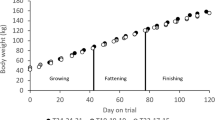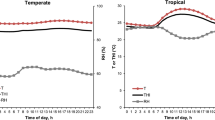Abstract
INVESTIGATION has shown both the marked influence of environmental temperature on the young pig's metabolic rate and the modification of the effect of environment due to grouping new-born pigs together1,2. Other work has emphasized the importance of ambient temperature in relation to animal production in pig husbandry3,4. Complementary to measurements of metabolism and growth is the determination of the environmental temperature which is preferred by the animal, and observations have been made on young pigs for this purpose.
This is a preview of subscription content, access via your institution
Access options
Subscribe to this journal
Receive 51 print issues and online access
$199.00 per year
only $3.90 per issue
Buy this article
- Purchase on Springer Link
- Instant access to full article PDF
Prices may be subject to local taxes which are calculated during checkout
Similar content being viewed by others
References
Mount, L. E., J. Physiol., 147, 333 (1959).
Mount, L. E., J. Agric. Sci., 55, 101 (1960).
Heitman, jun., H., and Hughes, E. H., J. Anim. Sci., 8, 171 (1949).
Bond, T. E., Agric. Eng. St. Joseph, Mich., 40, 544 (1959).
Winslow, C.-E. A., Herrington, L. P., and Gagge, A. P., Amer. J. Physiol., 120, 1 (1937).
Author information
Authors and Affiliations
Rights and permissions
About this article
Cite this article
MOUNT, L. Environmental Temperature preferred by the Young Pig. Nature 199, 1212–1213 (1963). https://doi.org/10.1038/1991212a0
Issue Date:
DOI: https://doi.org/10.1038/1991212a0
This article is cited by
-
The effects of ambient temperature, nature and temperature of the floor and radiant heat on the metabolic rate of the new—born pig
International Journal of Biometeorology (1970)
-
Field observations in Jamaica on thermal agalactia in the sow
Tropical Animal Health and Production (1970)
Comments
By submitting a comment you agree to abide by our Terms and Community Guidelines. If you find something abusive or that does not comply with our terms or guidelines please flag it as inappropriate.



